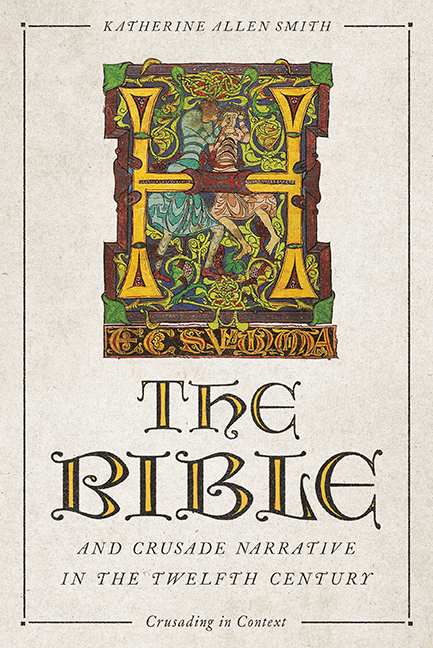Book contents
- Frontmatter
- Contents
- Acknowledgements
- List of Abbreviations
- Introduction
- Chapter 1 History and Biblical Exegesis in the Latin West
- Chapter 2 The Bible in the Chronicles of the First Crusade
- Chapter 3 Into the Promised Land
- Chapter 4 Babylon and Jerusalem
- Conclusion
- Appendix 1 Tables and Charts of Biblical References
- Appendix 2 List of Biblical References in the Texts
- Bibliography
- Index
Chapter 2 - The Bible in the Chronicles of the First Crusade
Published online by Cambridge University Press: 26 April 2020
- Frontmatter
- Contents
- Acknowledgements
- List of Abbreviations
- Introduction
- Chapter 1 History and Biblical Exegesis in the Latin West
- Chapter 2 The Bible in the Chronicles of the First Crusade
- Chapter 3 Into the Promised Land
- Chapter 4 Babylon and Jerusalem
- Conclusion
- Appendix 1 Tables and Charts of Biblical References
- Appendix 2 List of Biblical References in the Texts
- Bibliography
- Index
Summary
I cannot tell you all of the things we did … for there is in this land neither cleric nor layman who could describe or write down the whole of it.
— Gesta Francorum et aliorum HierosolimitanorumBut there are also many other things Jesus did which, if they were all written down, the world itself, I think, would not be able to contain the books that should be written.
— Gospel of John 21:25Even as it taxed the descriptive and interpretive powers of chroniclers across Christendom, the First Crusade inspired a greater outpouring of historical writing than any other event of the Middle Ages. In the decades after 1099, numerous chroniclers, preachers, liturgists, and poets tackled the job of making sense of events widely regarded as incredible and unprecedented, in so doing building up a mythology of the first crusaders’ deeds that ultimately inspired thousands to join the Second Crusade. The Scriptures had a central role to play within this ambitious commemorative project. At every stage of the process by which the crusade passed from event to living memory to written record, biblical texts and exegetical techniques smoothed the way, allowing Christians to find historical and spiritual meaning in the holy war.
As modern historians have often noted, the words of the Scriptures came readily to the minds of Christian narrators of the events of 1095–99. This is hardly surprising, in light of the close relationship between history and biblical exegesis traced in Chapter 1, and considering that the crusade's early historians were almost exclusively monks, canons, and priests well versed in the sacred texts and trained in at least the rudiments of exegetical methods. Indeed, the learned men who narrated the holy war's history would have had far more formal instruction in the art of biblical exegesis than in the writing of history. This is not mere conjecture; the crusade histories contain clear evidence of their authors’ interest in scriptural study, in the form of citations from patristic and Carolingian works of exegesis. Collectively, the crusade's chroniclers demonstrate knowledge of an impressive array of biblical scholarship, including works by Ambrose, Jerome, Augustine, Cassiodorus, Gregory the Great, Bede, and Hrabanus Maurus that were staples of eleventh- and twelfth-century libraries.
- Type
- Chapter
- Information
- The Bible and Crusade Narrative in the Twelfth Century , pp. 49 - 92Publisher: Boydell & BrewerPrint publication year: 2020



